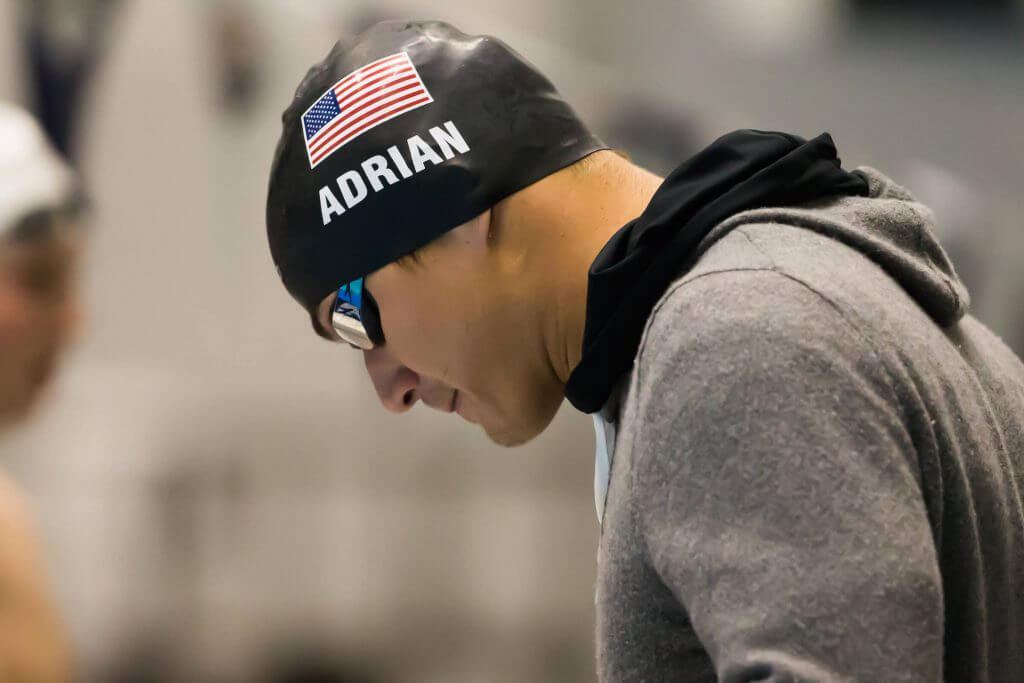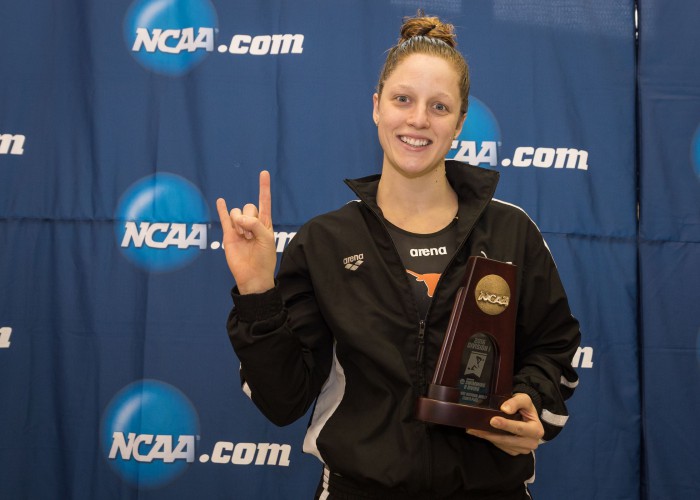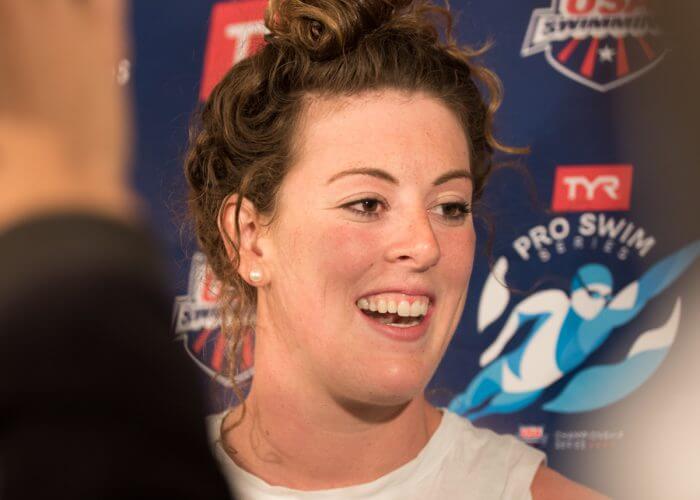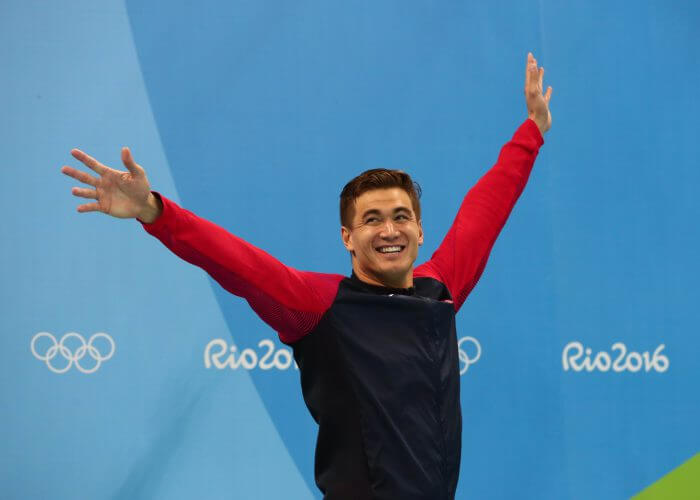Overcoming Adversity: A Tribute to Nathan Adrian

By Devin Javens, Swimming World College Intern.
Adversity is unavoidable and even affects the lives of our greatest idols. With recent news of Nathan Adrian‘s testicular cancer diagnosis, many swim fans can’t help but imagine America’s beloved sprinter no longer competing for USA Swimming. However, this might not be the case. In his announcement, Adrian mentions that he will be back to swimming in weeks to come and has not given up his sights on the Tokyo 2020 Olympics.
It is said that with every setback comes a major comeback. Like Adrian, the following swimmers have endured tremendous obstacles and much adversity, only to later achieve enormous success upon their return to the sport.
Madisyn Cox

Photo Courtesy: Reagan Lunn/Georgia Tech Athletics
In recent years, Madisyn Cox has started to become one of America’s top IMers. However, in March 2018, Cox faced a doping suspension which was enforced after testing positive for the substance Trimetazidine, which threatened to pull her out of the running for the 2020 Olympics. Her original sentence of two years had been reduced to six months after months of investigation that concluded Cox had been unknowingly ingesting a multi-vitamin which contained the banned substance. Due to the unfairly low amount of Trimetazidine in her system and the pristine reputation that preceded her, many believed that Cox was given an unfair sentence. The arguably unfair accusations against Cox had put her goals and aspirations as a member of the US National Team on the line.
Although it has only been a few months since Cox’s suspension has ended, she already has her sights set on the Olympic Trials in 2020. Despite the emotional toll of her suspension and the possible threat to her career, Cox is back at it and is already throwing down some significant times. At the Longhorn New Year’s Classic, Cox won the 200 IM with a 2:10.29 – just shy of her personal best time of 2:09.69 which granted Cox a second place finish at the 2017 Phillips 66 Summer Nationals. Cox’s time of 2:10.29 had earned her a significant win over the rest of the field, beating the second place finisher, Evie Pfeifer, by over five seconds. Faced with adversity that seemed to be a career-ending sentence, Cox is now back on track to be a strong competitor for the 2020 Olympic team.
Gary Hall Jr.

Photo Courtesy: Youtube/ Cura Foundation
At 24 years old and only a year prior to the 2000 Sydney Olympics, standout sprinter, Gary Hall Jr. was diagnosed with Type 1 diabetes. With no family history of the autoimmune disease, Hall was devastated and even became suicidal after being told he wouldn’t be able to swim competitively ever again. In the face of adversity, Hall’s goal of earning Olympic gold seemed to be ruined; however, his love for the sport wasn’t diminished. Hall decided to continue to pursue training for the Olympics while living with Type 1 diabetes and enduring symptoms of this disease, which include fatigue and blurred vision.
While trying to adjust to a life with Type 1 diabetes, Hall had to battle sporadic blood sugar levels. He recalls chugging three bottles-worth of a sports drink at the Goodwill Games to bring up his low blood sugar prior to his 50 freestyle, only to throw up in the middle of his race. Additionally, his high blood sugar levels have caused him to almost fall into an unconscious state during Sydney’s 400 medley relay ceremony as well as the 400 free relay at the 2000 Sydney Olympics. During this race, Hall’s dangerously high blood sugar levels may have caused him to develop ketoacidosis and perhaps cost the relay the gold medal. Healthline describes this state as “a serious complication of Type 1 diabetes and, much less commonly, of Type 2 diabetes. DKA (Diabetic ketoacidosis) happens when your blood sugar is very high and acidic substances called ketones build up to dangerous levels in your body.”
Hall had to live as a competitive swimmer with this complicated disease throughout the Sydney Olympics and will for the rest of his life. However, he defeated the odds by capturing two gold medals in addition to his silver and bronze medals during the Sydney Olympic Games. Hall went on to qualify for the 2004 Athens Olympics, earning another gold medal in the 50 freestyle and a bronze medal in the 400 freestyle relay, redeeming himself from the devastating loss four years prior.
Eric Shanteau

Photo Courtesy: Griffin Scott
Leading up to the 2008 Olympic Trials, Shanteau was in the running for being a first-time Olympian. As one of the United States’ fastest breastrokers, it seemed as if his fate was sealed and his summer would be spent preparing for the Beijing Olympic Games. However, a week before the Olympic Trials, Shanteau received news that he had testicular cancer. Not ready to give up on his dreams, Shanteau decided to postpone treatment and continue with training and racing in hopes of making the Olympic team.
Not only did he make the team but also went a best time in the 200 breaststroke in Beijing. Although he just narrowly missed out on making the finals, Shanteau’s perseverance and swimming withcancer at the world’s highest level of sports speaks for itself. Once the Beijing Games ended, Shanteau underwent surgery to remove the cancer and remained healthy while training with his sights set on the 2012 London Olympics. Four years later, Shanteau returned to the big stage – this time without cancer – and earned a gold medal in the 400 medley relay. Today, Shanteau is an advocate for cancer awareness.
Allison Schmitt

Photo Courtesy: Brooke Wright
Allison Schmitt has been a familiar name in the swimming world for the past decade. Making her first Olympic appearance in Beijing in 2008, Schmitt came back to the United States with a bronze medal in the 800 freestyle relay. However, the height of her swimming career was arguably at the 2012 London Games where Schmitt won five medals – three of them being gold. However, after the London Olympics with what seemed to be the best days of her life being behind her, Schmidt fell into a deep depression. Schmitt recalls feeling suffocated by the media attention and the severe change of pace from what she experienced during the games. This dramatic shift back to real life had her feeling suicidal, making her face significant adversity and some of the darkest days in her life.
Schmitt confronted her demons after her own cousin commit suicide in 2015. Devastated by this tragedy, she decided to seek help and work towards bettering her own mental health. Eventually, she enrolled in The Arizona State University School of Social Work to pursue an M.S.W. Her dream is to one day work with athletes and counsel them on their own mental health.
Within this past year, Schmitt’s return to swimming came about after briefly retiring after the 2016 Rio Olympics. With a career that seemed to end in relief, Schmitt decided to gradually return to the sport seemingly accidentally. As a way to stay in shape, she started swimming again while continuing her education at ASU. Under the coaching of Bob Bowman once again and training with the Sun Devil team, Schmitt started coming to practice more and more until she finally decided to start training full time again in early 2018. Her love for swimming returned as she decided to take a no-pressure approach to sport. Comparing it to her youth swimming career, she decided to enjoy the sport rather than stress over her times and results. She just wanted to swim. For her first competition since Rio, Schmitt attended the TYR Pro Swim Series in Mesa, where she finished second in the 200 free and sixth in the 100 free. Surprised by this success following over a year without racing, Schmitt’s confidence in her new approach heightened.

Photo Courtesy: Rob Schumacher-USA TODAY Sports
In his recent post on social media, Nathan Adrian wrote: “Life, like swimming the 100 free, can come at you hard and fast as you can’t always see who, or what, may be chasing you down.” Adversity is bound to happen to all of us, but how you handle it can determine your future. By using adversity as a positive factor, success is bound to happen. The swimming community is thinking of Nathan Adrian as he continues on his health journey and is anxiously awaiting his return to the sport.
All commentaries and research are completed by the author and do not necessarily reflect the views of Swimming World Magazine nor its staff.




Hope he is looking to add to his treatment to alternative approach such as redox….https://www.sciencedirect.com/science/article/pii/S2213231717309424
Natasha Cesareo Isabella Cesareo
???
???
Joe Stott
Prayers for a swift recovery.??????
Prayers for Adrian and his family. ???
Wish him well. But dont like his ” flu shots “. Athlete has to be a role model for health, not vaccines.
He is a role model. Vaccines are part of a healthy lifestyle as well as making sure that you are not the one responsible for spreading disease.
?????
Lyla Andrade
All the best to you and your family Adrian. Our prayers are with you.
Carla Mauri